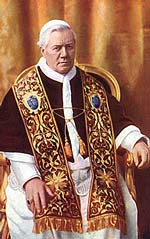 Shortly before his death, wise old Leo XIII told Cardinal Sarto that he would be the next pope and would do much for the Church. Leo was right on both counts.
Shortly before his death, wise old Leo XIII told Cardinal Sarto that he would be the next pope and would do much for the Church. Leo was right on both counts.
Giuseppe Sarto was born at Riese on June 2, 1835. His father, a cobbler, also served as janitor in the parish church and postman. A bright, pious lad, Giuseppe studied under his pastor, then at a nearby secondary school, and finally at the seminary in Padua. Ordained in 1858, Sarto worked hard and well as parish priest. In 1884 he became bishop of Mantua and did so much for that rundown diocese that Leo XIII made him a cardinal and moved him to Venice. Both as bishop of Mantua and patriarch of Venice, Sarto proved to be a zealous pastor and a highly capable administrator. In the conclave of 1903 Rampolla took an early lead, but Austria vetoed him and the cardinals turned to Sarto. He accepted unwillingly and took the name, Pius X.
Pius was not to enjoy peace. The French Republic was waging bitter war on the Church. The government suppressed religious orders, attacked religious education, and in 1905 unilaterally denounced the concordat, separated Church and State, and confiscated Church property. When Pius forbade Catholics to form the associations required by the government to run the churches, things looked desperate; but the government backed down from its extreme position, and though extremely poor, the French Church struggled on. In Spain and Portugal, too, Pius had the grief of seeing the Church attacked.
Attack from outside was not the greatest danger.
Some priests, infected with bad philosophical ideas and worse theological ones, were striving to make modernism prevail within the Church. Modernism does not mean a devotion to television or atomic research, but a very dangerous adaptation of the dogmas of faith to fads of the day. Pius banned the works of leading modernists, and by his encyclical "Pascendi" and his decree "Lamentabilis," published in 1907, he struck hard at modernism. Determined to tear it out by the roots, Pius followed these measures by demanding from every priest an oath against modernism. Under this attack the dangerous movement wilted, and the Church was saved much trouble by the saintly Pope's alert vigilance.
Pius took as his motto Paul's expression: "to restore all things in Christ." He made every effort to live up to it. He reformed Church music. He reorganized the papal court and Italian seminaries. He reformed the breviary. He started the tremendous work of codifying canon law. But above all, Pius will be remembered as the Eucharistic Pope. He wished children to receive Holy Communion when they reached the age of reason, and in a return to the early Christian practice he begged Catholics to receive Holy Communion frequently.
Pius X predicted that a great war would break out in 1914, but when it came it nearly broke his great heart. He died on August 20, 1914. The people, with touching devotion, kept thronging around the kind-hearted Pope's tomb. Miracles were worked. In June, 1951, Pius XII beatified and on May 29, 1954, canonized this great Pope of the Eucharist.
Excerpted from "Popes
Through the Ages" by Joseph Brusher, S.J.

